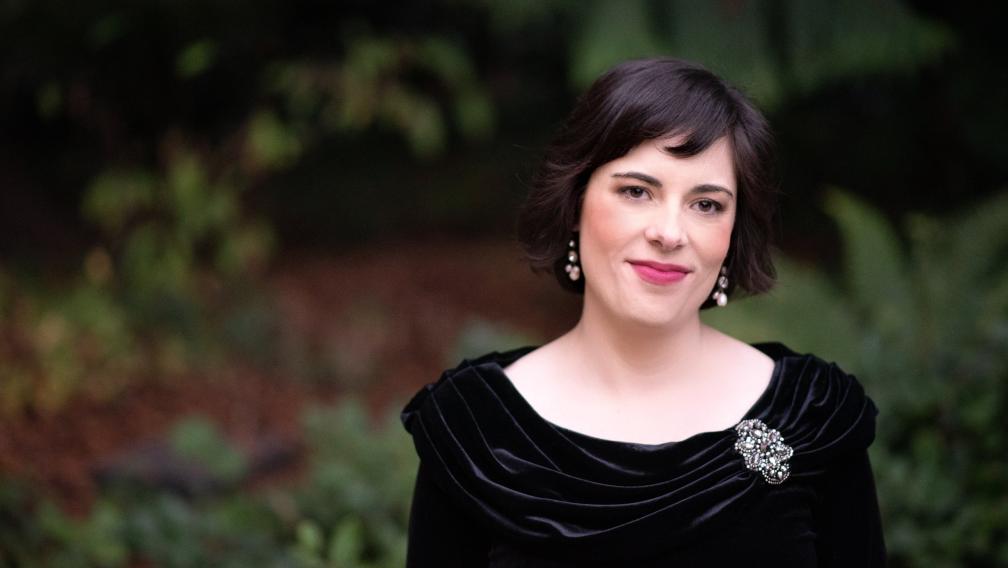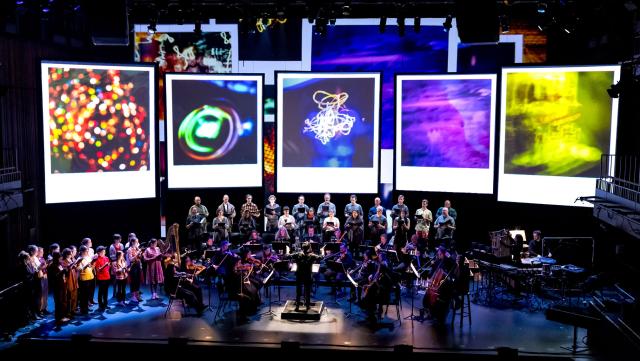Trinity’s New Music Passion

A Good Friday commission from acclaimed composer Jessica French puts a fresh spin on an old story — and helps Trinity fulfill an ambitious musical mission.
On April 18, worshippers at Trinity Church’s Good Friday service will once again have the chance to experience the chanted Passion story, an ancient choral work recounting Jesus’s betrayal, arrest, trial, and crucifixion, as told in the Gospel of John. But the Passion they will hear this year is something different: a reimagining of the music from acclaimed composer Jessica French, whose sacred works have been performed in cathedrals around the world.
The composition is part of a decades-long Trinity effort to do what was once commonplace in churches: commission sacred works that provide a brand-new take on age-old texts.
“We think of works like the chanted Passion as immutable, but they were once new, too,” says Trinity’s vicar, the Rev. Michael Bird. The Passion as Trinity has traditionally performed it contains choral responses written in 1585 by Spanish composer Tomas Luis de Victoria, but the story was chanted for centuries upon centuries before that. “Our goal is to bring something into the world that is every bit as strong, but in the musical vernacular of today,” says Bird.
That hope fuels Trinity’s larger musical mission: to push beyond its reputation for excellence in performing the great masters to produce new work that will find its own place in history. The Trinity team has commissioned, developed, and premiered operas, oratorios, symphonies, and boundary-pushing choral works by both rising stars and established composers. “We don’t just want to celebrate musical history,” says Melissa Baker, Trinity’s director of artistic planning. “We want to create it.”
“The traditional Victoria responses have served us well for many years, but I wanted to offer something unexpected” says Trinity’s Director of Music, Melissa Attebury. “What would a 21st-century composer bring to an ancient story so deeply rooted in the church?”
We don’t just want to celebrate musical history. We want to create it.”
Composer French, who has sung the Victoria chorus many times herself, was eager to answer that question — but she was also daunted. “People love the Victoria Passion, and Renaissance music in general,” she says.
She began the process of reinterpreting the Passion’s choral sections by taking a deep dive into the text.
“There’s so much pain in this story,” she says. For her, the Renaissance pleasantness of the Victoria music never conveyed that brutality. “I wanted to reflect the text accurately, to channel all the intense things that are happening to Jesus through my writing. What came out sometimes surprised me. To some small degree, we all experience the betrayal and grief and anger that Jesus did, and whether we are composing or listening, we bring those feelings — which are only accentuated by our times — to the story. The music I write can’t help but be affected by how difficult and divided the world is.”
The idea that music can play a role in bridging what divides us has been a driving force in Trinity’s music commissions for both high-profile secular works and new sacred music for the church’s worship services.
“When music meets people where they are, that creates sacred space,” says Father Bird. “This music helps us keep the liturgy meaningful for Trinity’s community.”
Trinity is deeply committed to highlighting underrepresented voices as well as a wide range of styles — from early music to traditional Anglican hymns to jazz, blues, and more — in part to reflect the church’s diverse congregation.
Recently, when Attebury was searching for a piece to use during Holy Eucharist, she discovered “My God, I Love Thee,” a choral anthem by Nigerian-American composer Shawn E. Okpebholo that had not yet been performed in New York. And when the Rev. Phillip Jackson, Trinity’s rector, wanted the choir to sing “I Never Heard a Man,” a favorite gospel blues piece that had no choral arrangement, Attebury asked choir member Shabnam Abedi to write one, drawing on her own jazz vocal and Indian music background.
For Baker, that confluence of old and new is where the magic happens. “Music history is a series of cycles. Musicians take the forms and structures of the past, and add new ideas, new information, new techniques — but also their experiences of today,” she says.
Since 2014, Trinity has premiered more than 100 compositions, forging relationships with pioneering arts organizations. In 2017, the church asked Paola Prestini, a trailblazing Italian-American composer and founder of the new-music organization National Sawdust, to contribute her own modern take on the traditional mass, resulting in her vibrant work The Imaginary World of Wild Order. The 2023 world premiere of Benedict Sheehan’s oratorio Akathist, produced with Artefact Ensemble, earned a Grammy nomination for Trinity Choir, Trinity Youth Chorus, Trinity’s Downtown Voices, and its new-music ensemble NOVUS. In 2024, with underground concert producers Death of Classical, the church commissioned award-winning cellist Andrew Yee’s This Love, a meditation on motherhood, which was performed in the Crypt of St. John the Divine. Also in 2024, in partnership with repeat collaborator the Perelman Performing Arts Center, Trinity presented the world premiere of Luna Pearl Woolf’s groundbreaking multimedia oratorio, Number Our Days.
Trinity has also made new music by nurturing homegrown talent. “I went from composing behind closed doors to being somebody whose name is recognized,” says Jonathan Woody — a well-known bass-baritone soloist who joined Trinity Choir in 2011.
“In 2015, Jonathan composed new music for the mass, which we began using at Trinity, and he has written us a number of works since,” says Attebury. Such support is everything to a young writer; Woody has since received commissions from the Handel and Haydn Society and the Cathedral Choral Society of Washington, D.C.
As with so much of what Trinity does, its commitment to elevating new pieces and composers builds faith and community, too. Since the church began bringing free concerts to New Yorkers more than a hundred years ago, Trinity has leaned into music’s power to connect us with one another — and with the divine.
“When you draw a bow across strings or a choir lifts its voice, you get that resonance, that pure sound, that fills the room and suddenly fills you. For me, it’s of God,” says Father Bird. “Music inspires authentic connection — it’s not about one person or another, it’s about us, together.”
For Father Bird, that was reason enough to entrust French with her Good Friday task. “If reinterpreting the Passion text was transformational for Jessica in the writing of it, it will be transformational for our choir in singing it,” he says. “And that will surely be transformational for our congregation in hearing it.”
Join us for the Liturgy of Good Friday, including Jessica French’s setting of the St. John Passion, April 18, 2025, at 12:05 pm or online at trinitychurchnyc.org.






